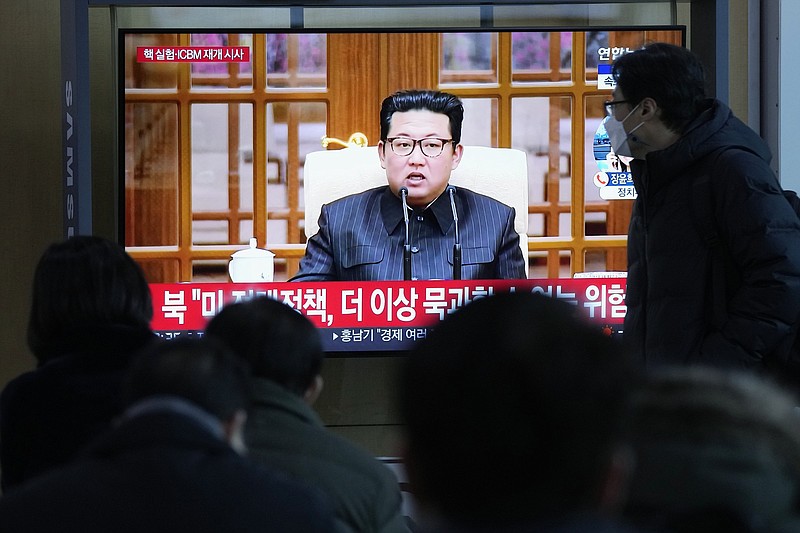SEOUL, South Korea -- Accusing the United States of hostility and threats, North Korea announced Thursday it will consider restarting "all temporally-suspended activities" it had paused during its diplomacy with the Trump administration, in an apparent threat to resume testing of nuclear explosives and long-range missiles.
North Korea's official Korean Central News Agency said leader Kim Jong Un presided over a Politburo meeting of the ruling Workers' Party where officials set policy goals for "immediately bolstering" military capabilities to counter the Americans' "hostile moves."
Officials gave instructions to "reconsider in an overall scale the trust-building measures that we took on our own initiative ... and to promptly examine the issue of restarting all temporally-suspended activities," the news agency reported.
Experts say Kim is reviving an old playbook of brinkmanship to extract concessions from Washington and neighbors as he grapples with a decaying economy crippled by the pandemic, mismanagement and U.S.-led sanctions over his nuclear ambitions.
North Korea has been ramping up its weapons demonstrations recently, including four rounds of missile launches just this month, in an apparent effort to pressure Washington over a prolonged freeze in nuclear diplomacy.
The North's Foreign Ministry had already warned of stronger action after the Biden administration last week imposed fresh sanctions over its continued missile tests. The U.N. Security Council scheduled a closed-door meeting for Thursday to discuss North Korea and non-proliferation matters.
Last week, the U.S. Treasury Department imposed sanctions on five North Koreans over their roles in obtaining equipment and technology for the country's missile programs.
The State Department ordered sanctions against another North Korean, a Russian man and a Russian company for their broader support of North Korea's weapons of mass destruction activities. The Biden administration also said it would pursue additional U.N. sanctions over the North's tests.
South Korea said its military was closely monitoring the North as it urged its rival to return to dialogue.
China, North Korea's main ally, repeated its denouncement of U.S. sanctions through a Foreign Ministry briefing on Thursday, calling them a source of tension on the Korean Peninsula. China has avoided criticizing the North over its recent missile launches and endorsed a return to multinational disarmament talks hosted by Beijing that have stalled since 2008.
North Korea appeared this month to have resumed railroad freight traffic with China that had been suspended for two years.
It conducted its sixth and last test of a nuclear explosive device in September 2017. and its last launch of an intercontinental ballistic missile was in November that year.
Claiming U.S. hostility has reached a "danger line" that can no longer be overlooked, the North Korean Politburo members called for practical measures to "more reliably and effectively increase our physical strength for defending dignity, sovereign rights and interests of our state," the Korean Central News Agency said.
They criticized United States of continuing its military exercises with South Korea and arming its ally with advanced weaponry and claimed -- apparently falsely -- that Washington is continuing to send strategic assets to the region to pressure the North.
The United States since 2018 has dramatically scaled down its combined exercises with South Korea, which have mostly been reduced to computer simulations, to make room for diplomacy with North Korea and over covid-19 concerns.
Duyeon Kim, an analyst at Washington's Center for a New American Security, said North Korea's claim of U.S. hostility is a pretext for continuing testing.
"Pyongyang is squarely focused on meeting its nuclear weapons milestones because of its military imperative to do so. This means more tests to come," she said. "The pandemic has bought Pyongyang ample time to continue developing nuclear weapons because North Korea closed its borders and has been refusing direct talks, afraid of importing the virus."
